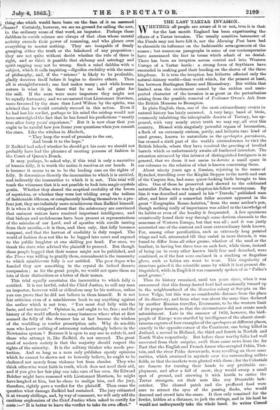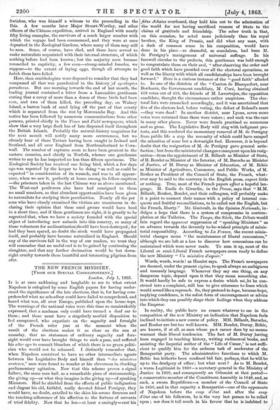THE LAST TARTAR INVASION._
yiTH_ETIIER all people are aware of it or not, true it is that; for the last month England has been experiencing the effects of a Tartar invasion. The usually sensitive barometer of the Funds may not have felt it, nor the Morning Post have had to chronicle its influence on the fashionable arrangements of the season ; but numerous paragraphs in some of our contemporaries have announced the fact in terms which admit of no denial. There has been an irruption across central and into Western Europe of a Tartar horde : a strong force of Scythians have succeeded in making good their landing on the shores of the three kingdoms. It is true the irruption has hitherto affected only the natural-history world—that world which, for the present at least, lies between Burlington House and Bloomsbury. But within that limited area the excitement caused by the sudden and. unex- pected character of the invasion is as great as the perturbation arising from the possible removal of Professor Owen's Ark from the British Museum to Brompton.
In plain English, then, one of the most extraordinary events in natural history has lately occurred. A very large band of birds, commonly inhabiting the inhospitable deserts of Tartary, has ap- peared, with very nearly strict truth we may say, all over this country. Blessed with singularly powerful organs of locomotion, a flock of an extremely curious, portly, and hitherto rare kind of sand grouse, known to naturalists as the syrrhaptes paradoxes, has crossed a sixth part of the world's circumference to visit the British Islands, where they have received the greeting of levelled barrels which so unfortunately awaits all feathered intruders. The attention attracted by this inburst of distinguished foreigners is so general, that we deem it not amiss to devote a small space in our columns to the relation of what is known concerning them.
About ninety years ago a Russian, rejoicing in the name of Rytschof, travelling over the Kirghiz Steppes to the north and east of the Caspian Sea, had some queer-looking birds brought to him alive. One of these he preserved and showed to the celebrated naturalist Pallas, who was by adoption his fellow countryman. By him it was described and named in his "Travels," published soon after, and later still a somewhat fuller account appeared in the great " Zoographia Rosso-Asiatica," from the same author's pen, though nothing really of importance was added to the knowledge of its habits or even of the locality it frequented. A few specimens occasionally found their way through some devious channels to the museums of Western Europe, but that was all ; and it was justly accounted one of the scarcest and most extraordinary birds known. For, among other peculiarities, such as extremely long pointed wings and tail, attenuated till they ended in mere threads, it was found to differ from all other grouse, whether of the sand or the heather, in having but three toes on each foot, while these, instead of being (as in every other known bird) free and detached, were combined, as if the foot were enclosed in a stocking or fingerlesa glove, such as babies are wont to wear. This singularity of structure gained it the scientific name by which it is at present dis- tinguished, while in English it was commonly spoken of as " Pallas's sand grouse."
Thus its history remained, until ten years since, when it was announced that this funny-footed fowl had occasionally turned up in the neighbourhood of the Moravian colony at Sarepta on the lower Volga, but this was no considerable distance from the place of its discovery, and from what was about the same time declared by another Russian traveller, Eversmann, to be the western limit of its proper haunts, so that the circumstance did not create much astonishment. Late in the summer of 1859, however, the bird- people of Europe were startled by intelligence of the almost simul- taneous capture of four examples of the syrrhaptes at different places, exactly in the opposite corner of the Continent, one being killed in Jutland, a second in Holland, the third and fourth in Norfolk and North Wales respectively. But before these worthy folks had well recovered from their surprise, swift there came news from the far East that the English and French forces who occupied Pekin, Tien- tsin, and the river Peiho downwards, were revelling on these same rarities, which swarmed in myriads over the surrounding millet- fields, so that the markets were glutted with them ; for the Celestials axe famous for turning their hands to any profitable em- ployment, and after a fall of snow, they would sweep a small spot of ground, and strewing it with lentils to entice the Tartar strangers, set their nets like any Dunstable lark- catcher. The cleared patch and the proffered food were sure to attract the eyes of the passing flocks, who would descend and crowd into the ware. It then only remained for the fowler, hidden at a distance, to jerk the strings, and in his haul he would not unfrequently take the whole band. So writes Consul
Swinhoe, who was himself a witness to the proceeding in the Ibis. A few months later Major Stuart-Wortley, and other officers of the Chinese expedition, arrived in England with nearly fifty living examples, the survivors of a much larger number with which the voyage had been commenced, and they were at once deposited in the Zoological Gardens, where many of them may still be seen. Some, of course, have died, and these have served to make naturalists acquainted with their internal structure, of which nothing before had been known ; but the majority soon became reconciled to captivity, a few even—strong-minded females, we suppose—to the extent of laying eggs, though all attempts to hatch them have failed.
Here, then ornithologists were disposed to consider that they had compassed all that was paradoxical in the history Of syrrhaptes paradoxes. But one morning towards the end of last month, the leading journal contained a letter from a Lancashire gentleman stating that a covey of more than a dozen of these birds had been seen, and two of them killed, the preceding day, on Walney Island, a barren bank of sand lying off the part of that county which is separated from the rest by Morecambe Bay. And this notice has been followed by numerous communications from other persons, printed chiefly in the Times and Field newspapers, which show that a very large flock has of late dispersed itself throughout the British Islands. Probably the natural-history magazines for the next month will notify many more occurrences, but we already hear of these Tartars having been caught in Ireland and Scotland, and all over England from Northumberland to Corn- wall. The number of captures seem to have been greatest in the eastern counties, and chiefly in Norfolk, whence one gentleman writes to say he has inspected no less than fifteen specimens. The Zoological Society has received one living bird, which a few days ago was reported by the keeper to be doing "as well as could be expected" in consideration of its wounds, and was to all appear- ance, when we saw it, perfectly at home among its fellow-captives —the prisoners taken in the last Chinese war as above mentioned. The West-end poulterers also have had consigned to them no small numbers, so that abundant opportunities have been given to naturalists for studying their peculiarities. Nearly all the per sons who have closely examined the victims are unanimous in de- claring their opinion that these sand grouse would have bred in a short time, and if these gentlemen are right, it is greatly to be regretted that, when we have a society founded with the special object of introducing new animals into this country, so many of these volunteers for acclimatization:should have been destroyed ; for had they been spared, no doubt the stock would have propagated itself, and probably have become naturalized in England. Should any of the survivors fall in the way of our readers, we trust they will remember that no useful end is to be gained by continuing the slaughter, and that any farther decimation would be but down- right cruelty towards these beautiful and interesting pilgrims from afar.































 Previous page
Previous page